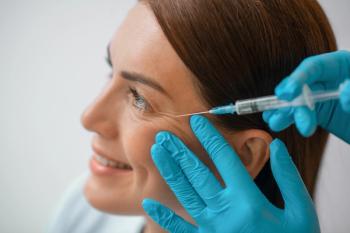
- Dermatology Times, August 2021 (Vol. 42, No. 8)
- Volume 42
- Issue 8
Biomarker Associated with Hair Loss Also Linked to COVID-19 Severity
New study data presented at EADV demonstrated an association between COVID-19 severity in male patients and the sex hormone androgen.
Researchers discovered a novel biomarker to identify male COVID-19 patients most at risk for ICU admission, according to data presented at the European Academy of Dermatology and Venereology (EADV)’s 2021 Spring Symposium. The data suggested patients with phenotypes sensitive to androgen, a male sex hormone, are more likely to experience severe COVID-19 disease.1
A study was conducted after researchers noticed an association between the androgen receptor (AR) and COVID-19. They observed a higher number of male patients hospitalized with COVID-19 that also were diagnosed with androgenetic alopecia compared to the number in a similar age-matched population (79% vs 31-53%).
Androgenetic alopecia is controlled by variations in the AR gene, which affects how sensitive the body is to androgens. An enzyme implicated in COVID-19 infection, Transmembrane serine protease (TMPRSS2), is regulated by an androgen response element. It implies that it too may be affected by variations in the AR gene. This researcher’s objective was to identify the connection between polyglutamine repeat region (CAG)’s repeated region length and predisposition to increased COVID disease severity. This is because the CAG located in the AR gene and is associated with both androgen sensitivity and androgenetic alopecia.
A prospective study measured the AR CAG repeat length of 65 hospitalized male patients that were COVID-19 positive. Researchers found that male patients diagnosed with COVID that also had a CAG repeat below 22 nucleotides were significantly less likely to be admitted into the ICU than patients with a CAG count greater than or equal to 22 nucleotides.
“Our data show that longer AR CAG scores are associated with more severe COVID‐19 disease and indicate that AR CAG repeat length could be used as a biomarker to help identify male COVID‐19 patients most at risk for ICU admissions,” said Andy Goren, MD, the chief medical officer at Applied Biology, Inc., Irvine, California. “The identification of a biomarker connected with the androgen receptor is another piece of evidence highlighting the important role of androgens in COVID-19 disease severity.”
Other research reported at the EADV Spring Symposium explored a promising new therapy for COVID-19 that used a novel androgen receptor antagonist to regulate the TMPRSS2 expression and possibly treat COVID-19 patients. The results of this study were submitted for publication in a peer-reviewed journal.
“This research demonstrates the scientific value of dermatology by offering key insights into the role of genetics and its link to COVID disease. It is an excellent example of some of the pioneering abstracts being showcased at The EADV Spring Symposium this year,” said Lidia Rudnicka, PhD, EADV board member and professor at the Medical University of Warsaw, Warsaw, Poland.
Reference:
1. A. Goren. Novel biomarker linked to hair loss can determine COVID severity in men. Presented at the European Academy of Dermatology and Venereology’s 2021 Spring Symposium May 6-7 2021. Accessed May 11, 2021.
Articles in this issue
over 4 years ago
Shrinking Staff Levels Can Lead to Unhappy Patientsover 4 years ago
Hair Hang-Upsover 4 years ago
Curcumin Shows Promise as New Sunscreen Filterover 4 years ago
Immunotherapy Helps Manage Skin Disease in Patients with Cancerover 4 years ago
Study: Curcumin Nanoparticles as a Photoprotective Adjuvantover 4 years ago
Novel Rosacea Treatment Demonstrates Efficacyover 4 years ago
Filler Hypersensitivity Post COVID-19 Illnessover 4 years ago
Climate Change Takes Toll on Skin Healthover 4 years ago
Ritlecitinib Delivers Topline Results in Alopecia Areata StudyNewsletter
Like what you’re reading? Subscribe to Dermatology Times for weekly updates on therapies, innovations, and real-world practice tips.











